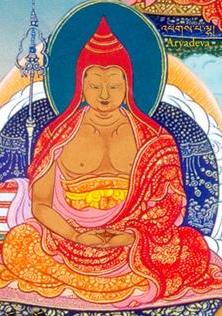Gunaprabha: Difference between revisions
Jump to navigation
Jump to search
mNo edit summary |
mNo edit summary |
||
| Line 1: | Line 1: | ||
[[Image:Gunaprabha.JPG|frame|Gunaprabha]] | [[Image:Gunaprabha.JPG|frame|Gunaprabha]] | ||
'''Gunaprabha''' (Skt. ''Guṇaprabha''; Tib. ཡོན་ཏན་འོད་, ''Yönten Ö''; [[Wyl.]] ''yon tan 'od'') — an Indian master of the [[Vinaya]] tradition born in the seventh century and a disciple of [[Vasubandhu]]. According to one tradition, he is considered as one of the ‘[[Two Supreme Ones]]’—great commentators on the [[Buddha]]’s teachings. | '''Gunaprabha''' (Skt. ''Guṇaprabha''; Tib. [[ཡོན་ཏན་འོད་]], ''Yönten Ö''; [[Wyl.]] ''yon tan 'od'') — an Indian master of the [[Vinaya]] tradition born in the seventh century and a disciple of [[Vasubandhu]]. According to one tradition, he is considered as one of the ‘[[Two Supreme Ones]]’—great commentators on the [[Buddha]]’s teachings. | ||
==Writings== | ==Writings== | ||
Revision as of 16:45, 1 February 2011

Gunaprabha (Skt. Guṇaprabha; Tib. ཡོན་ཏན་འོད་, Yönten Ö; Wyl. yon tan 'od) — an Indian master of the Vinaya tradition born in the seventh century and a disciple of Vasubandhu. According to one tradition, he is considered as one of the ‘Two Supreme Ones’—great commentators on the Buddha’s teachings.
Writings
Further Reading
- Paul K. Nietupski, 'Guṇaprabha’s Vinayasūtra Corpus: Texts and Contexts', JIATS 5, 2009 (Available online here)